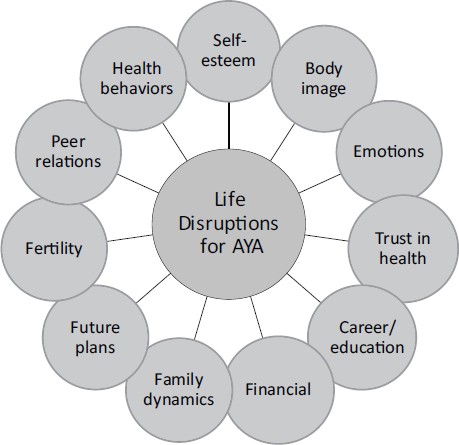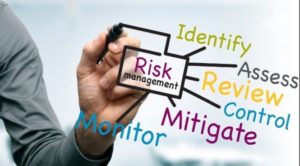
Diagnosed with Cancer? Your two greatest challenges are understanding cancer and understanding possible side effects from chemo and radiation. Knowledge is Power!
Learn about conventional, complementary, and integrative therapies.
Dealing with treatment side effects? Learn about evidence-based therapies to alleviate your symptoms.
Click the orange button to the right to learn more.
- You are here:
- Home »
- Blog »
- side effects ID and prevention »
- AYA Cancer- Mental Therapies
AYA Cancer- Mental Therapies

AYA cancer survivors have more severe depression and anxiety than non-cancer survivors? Gee, remarkable findings. You mean that after living with short, long-term and late stage side effects AYA cancer survivors get anxious and/or depressed?
I have lived with a variety of long-term and late stage side effects from my own cancer treatments in 1995. The key difference between myself and AYA cancer survivors is that I was originally diagnosed in early 1994. Meaning I’ve lived with
- chemobrain
- nerve damage (I am barely ambulatory)
- heart damage
- bladder damage
and more- during the decades in my life long after I worried about my body image, how often I urinated, etc. Though I was young as cancer survivors go, I was not an adolescent or young adult.
I copied the link below because it was on the original study linked below. Infertility is an issue that may be on the minds of your average AYA cancer survivor.
What are the typical short, long-term and late stage side effects risked by AYA cancer survivors that can depress and make them anxious?
Short-Term Side Effects:
- Fatigue: Feeling extremely tired or exhausted is a common short-term side effect of cancer treatments.
- Nausea and Vomiting: Chemotherapy and radiation therapy can cause nausea and vomiting.
- Hair Loss: Some cancer treatments may lead to temporary or permanent hair loss.
- Immune System Suppression: The immune system may be weakened, making the individual more susceptible to infections.
- Pain: Cancer treatments can cause pain, either directly or as a side effect.
Long-Term Side Effects:
- Cognitive Issues: Some survivors may experience cognitive impairments, often referred to as “chemo brain,” which can include memory and concentration problems.
- Cardiovascular Issues: Certain treatments, such as radiation and certain chemotherapy drugs, may increase the risk of heart problems.
- Fertility Issues: Cancer treatments can affect reproductive organs, leading to fertility issues.
- Bone Health: Radiation and certain medications can affect bone health, leading to conditions like osteoporosis.
- Hormonal Changes: Some treatments may disrupt hormonal balance, leading to issues like early menopause.
- Secondary Cancers: There is an increased risk of developing secondary cancers as a result of previous cancer treatments.
Late-Stage Side Effects:
- Psychosocial Challenges: Survivors may face long-term emotional and psychological challenges, including anxiety, depression, and post-traumatic stress disorder (PTSD).
- Chronic Health Conditions: Survivors may be at an increased risk of developing chronic health conditions related to cancer treatment, such as diabetes or thyroid disorders.
- Peripheral Neuropathy: Nerve damage, leading to symptoms like numbness and tingling, may persist or develop later on.
- Organ Dysfunction: Late-stage effects can include dysfunction of organs such as the kidneys, liver, or lungs due to the long-term impact of treatments.
- Financial and Employment Challenges: Cancer survivors may face challenges related to employment and financial stability due to the impact of the disease and its treatment.
The devil’s bargain that conventional oncology has struck with pediatric and AYA cancers is laudable to some extent. Oncology figured out that by giving the patients aggressive, high doses of chemotherapy and radiation, they could increase the five year survival rate to more than 85% of all patients.
Unfortunately, that aggressive, toxic therapy causes a host of health problems for the rest of the cancer survivor’s life.
And I have to be honest and admit that if my son had been diagnosed with some form of cancer when he was young, I too would have accepted this bargain. At the same time, I also have to admit that I live with many of the long-term and late stage side effects listed above.
What’s the solution to the mental health challenges faced by AYA cancer survivors?
What I refer to as mind-body therapies. Multiple myeloma is the blood cancer that I have. But the mind-body therapies are universal and can help survivors of all cancers. Scroll down the page to see a long list of links to posts about mind-body therapies.
Mind-body Therapy and Multiple Myeloma
Are you a pediatric or AYA cancer survivor? Do you suffer from depression or anxiety? Let me know-
David.PeopleBeatingCancer@gmail.com
David Emerson
- Caner Survivor
- Cancer Coach
- Director PeopleBeatingCancer
AYA Cancer Survivors May Have Poor Mental Health Years After Diagnosis
“Patients who have cancer as an adolescent or young adult (AYA) may have poor mental health years after diagnosis, according to a study published in JNCI Cancer Spectrum.
Researchers found that AYA cancer survivors had more severe depression and anxiety than patients without a history of cancer.
Though increasing time from diagnosis reduced the likelihood of mental health problems, the cancer survivors still had a higher risk of mental health problems than the control group…
This study included data from 639 patients who were diagnosed with cancer as AYAs (ages 15-39) and 29,793 control individuals without a history of cancer. The cancer survivors had a weighted average of 20.5 years since their diagnosis…
“[O]ur findings of excess anxiety and depression in AYA cancer survivors … decades after a cancer diagnosis call out the need for more investigation of this issue in this at-risk population,” the researchers wrote. “Future research should work to improve adherence to mental health screening and how best to intervene to ensure adequate care for all survivors of AYA cancer.””
Reference
Baclig NV, Comulada WS, Ganz PA. Mental health and care utilization in survivors of adolescent and young adult cancer. JNCI Cancer Spectrum. Published online November 20, 2023. doi:10.1093/jncics/pkad098


